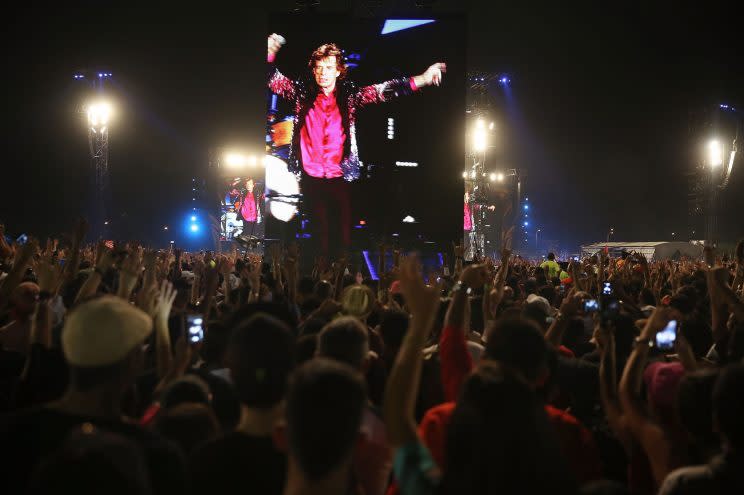Obama sparked a tidal wave of change in Cuba. Trump’s new policy misses the point.
The Rolling Stones played in Cuba last May, after decades in which their music was either banned or ignored by the tyrants in Havana. They were right to be afraid. As crowds surged out of the concert grounds, a dozen young men began a call-and-response chant: “Who made this possible? Obama made this possible!”
Former President Barack Obama didn’t really summon Keith Richards, or turn Cuba overnight into a paradise of freedom. But emotion, and the momentum behind such symbolic moments, is powerful on an isolated island. President Trump’s strident announcement in Miami, by contrast, included a promise to peel back parts of the “terrible and misguided deal” Obama struck with Cuba. The president instead asked Cuba to “come to the table with a new agreement that is in the best interest of their own people,” but his restrictions will likely stop real progress on the island, even if they were greeted in Florida with shouts of “We love you, Donald!”
Tump talked tough, saying that “we now hold the cards” in the relationship with Cuba, but he may have just traded those cards away. His speech was tough, demanding free elections and the return of American fugitives, but his actual changes are just partial restrictions and minor retrenchments — a nothingburger, compared to what Sen. Marco Rubio, R-Fla., and other hardline Cuban-American voices had requested. Trump’s real policy is obvious for what it does not do. U.S.-based airlines will continue to fly to Cuba, American cruise ships can continue to call in Cuban harbors and there will be no return to the “wet foot/dry foot” policy that allowed Cubans immediate and unrestricted immigration if they succeeded reaching United States soil. The biggest change limits Americans to one visit per year, with fewer ways to justify that travel.
The only art in this deal was Trump’s careful targeting of the Cuban military. The armed forces are more than just custodians of security in Cuba. They play a large role in the economy, controlling an estimated 40 to 60 percent of the nation’s GDP. Holding companies run by the army — one of Cuba’s only functioning bureaucracies — dominate tourism. Flying to Santiago de Cuba on Gaviota airlines? Then your pilot is usually a Cuban air force officer seconded to the tourism business as a way of attaining his monthly flight time. That lobster restaurant at the historic fort overlooking Havana? The manager is an army colonel in a floral print shirt. Gaviota buses and Gaviota hotels are everywhere on the island, and it is just one small part of GAESA, the military conglomerate that oversees much of Cuba’s food production, transportation and energy distribution. The military recently went as far as seizing the historic real estate of Old Havana, the heart of Cuba’s tourism engine, for itself, a sign of how desperately the Castro regime seeks to control the economic high ground of the future.

Trump will ban business with all of these pseudo-military companies, and argued that “profits from investment and tourism flow directly to the military.” But the truth is much the reverse: Thanks to its tourism engagement, the “military” in Cuba is now the single-largest contractor of private sector Cubans, buying their services to support tourism and selling them goods to spawn more business. That “air force” pilot probably doesn’t even have a military plane to fly. It is regular Cubans who are now starting to dominate their own military-industrial complex.
The radical growth of the Cuban economy since Obama’s reforms is undeniable, and should be encouraged. Hundreds of thousands of Cubans have found new employment, and tourism has been the forward edge. In the case of Airbnb alone, $40 million has been paid to Cuban hosts in two years, giving many families a tenfold increase in their incomes — in some cases a 100-fold increase. Obama’s reforms were accelerating the formation of a middle class in Cuba. The norms, expectations, and demands of that middle class were becoming crucial to the island’s transformation. Thousands of companies now exist in the space once occupied only by the Marxist state — but Trump’s policy will, in attempting to shrug off the military sector, simply end up weakening the survival and escape strategies of millions of Cubans.
Yes, the Cuban government takes money from tourism and pays for a repressive police apparatus. But the benefits of the tourism sector — economic independence from the regime, solid incomes, a chance to eat and clothe their kids — actually give Cubans more room to object, speak, protest, and free themselves. Escaping from the Cuban state begins with escaping from its economic control, and building new business and norms. Trump missed a chance to double down on the business-first strategy he himself has always advocated. It may be satisfying to denounce “the true and brutal nature of the Castro regime,” but 54 years of embargo already proved how ineffective that strategy is. Two years of Obama’s engagement did more to pry Cuba out of its shell than anything else. Engagement worked exactly because the Castro dictatorship gives no one their rights.
Patrick Symmes is the author of The Boys from Dolores: Fidel Castro’s Schoolmates from Revolution to Exile.
Read more from Yahoo News:


